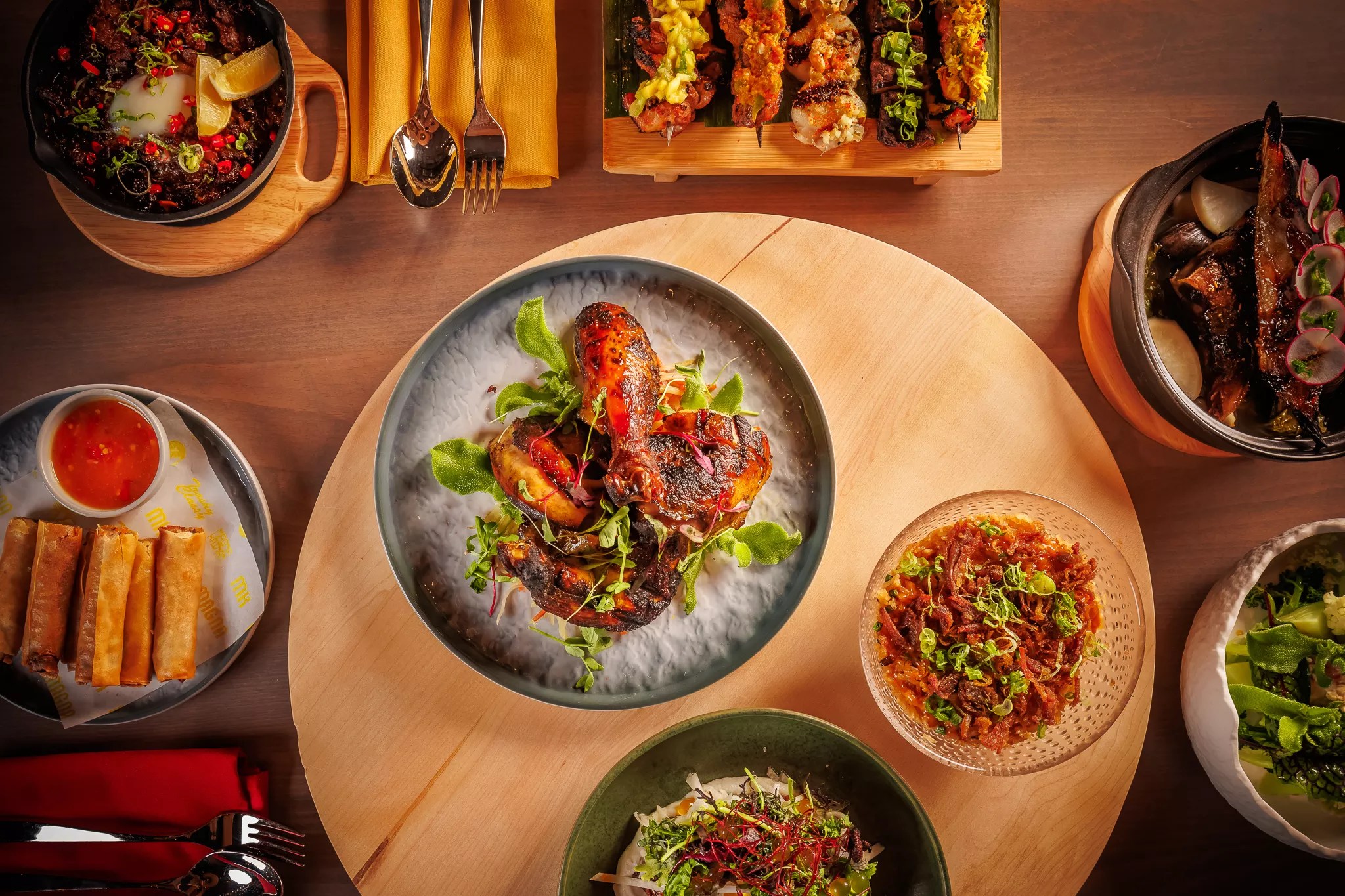
Connor Stehr

Audio By Carbonatix
In November, a new Filipino restaurant opened in Denver – but it’s not serving your tita’s adobo.
Chef Carlo Lamagna, whose flagship restaurant, Magna Kusina, is in Portland, Oregon, collaborated with the Culinary Creative Group on Magna Kainan, a contemporary eatery located at 1350 40th Street in RiNo, and he’s on a mission to change the way we talk about Filipino food.
Magna Kainan is one of two Culinary Creative Group projects attached to the luxury Novel by Crescent Communities apartment complex. The other is Sorry, Gorgeous, the newly opened rooftop bar and cocktail lounge.
Located on the ground floor, Magna Kainan seats just over 100 guests in its dining room, bar, lounge area and a private dining room that can accommodate large parties. The design is a tribute to the Philippines, with a mix of traditional and contemporary accents plus the Filipino flag hanging proudly in the dining room. “We want to bring a fun experience to you without compromising our culture,” Lamagna notes.
The venture was sparked by Lamagna’s longtime friendship with Culinary Creative’s chief culinary officer, chef Max MacKissock. The two initially connected when Lamagna competed in an East Coast versus West Coast culinary competition in 2013; MacKissock’s wife, Rioja owner and chef Jennifer Jasinski, was the West Coast coach at the event. “Long story short, we made some connections and figured out that we knew a lot of the same people,” Lamagna says. “We hit it off during that trip, and we’ve stayed in touch ever since.”
As their friendship evolved through the years, MacKissock would regularly call to catch up and discuss all the exciting restaurant openings in Denver in an attempt to coax Lamagna to make the move to Colorado. Eventually, Lamagna did relocate – from Chicago to Portland, to open Magna Kusina. But the timing for a move to Denver never quite lined up until a few years ago, when the Novel complex was being developed.
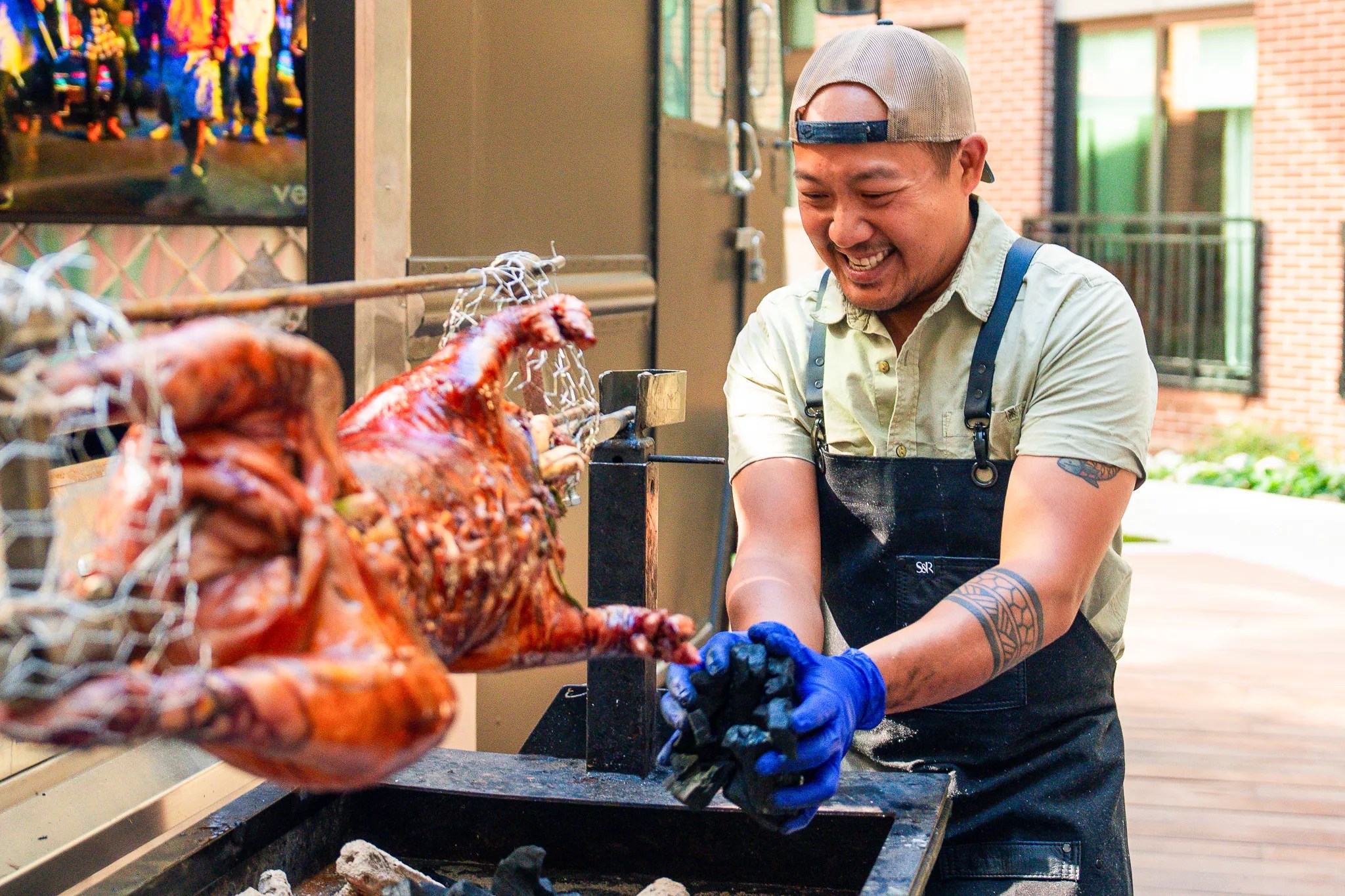
Carlo Lamagna’s first venture in Denver has been years in the making.
Chris Marhevka
MacKissock called Lamagna again and told him that the space was moving fast. Within a week, Lamagna visited Denver to check it out and spent 24 hours bonding with the Culinary Creative team and getting to know its co-founder and CEO, Juan Padró.
“I realized that a lot of the group’s values and outlook on life in general lined up with mine, and not just through business, but culturally,” Lamagna says of Padró. “The fact that he really focuses on the community was really important to me. Combine that with Max being an amazing human being and chef in his own right, and it just made sense to me.”
Lamagna recalls MacKissock telling him, “‘Denver’s really needing a Filipino concept. There’s a couple here, but nothing like what you’re doing in Portland.'” Magna Kainan, Lamagna explains, is the natural extension of Magna Kusina. “Our mission has always been to bring Filipino food and culture to the forefront. Our food can and will be a force to be reckoned with.”
The chef’s creative process begins with his family’s influences. Lamagna was born in the Philippines, spent his early childhood in Detroit, and moved back to the Philippines at age eleven. He recalls watching his uncles butcher goats when he was a kid, getting to kill his first pig for a family gathering at age eleven, and cooking Food Network recipes with his sister at fourteen. Witnessing the process from start to finish, he says, gave him an appreciation for the ingredients, the craft and the function of a well-made meal. “It was knowing that deep down inside, I’ve always had the knowledge of food and where food came from.”
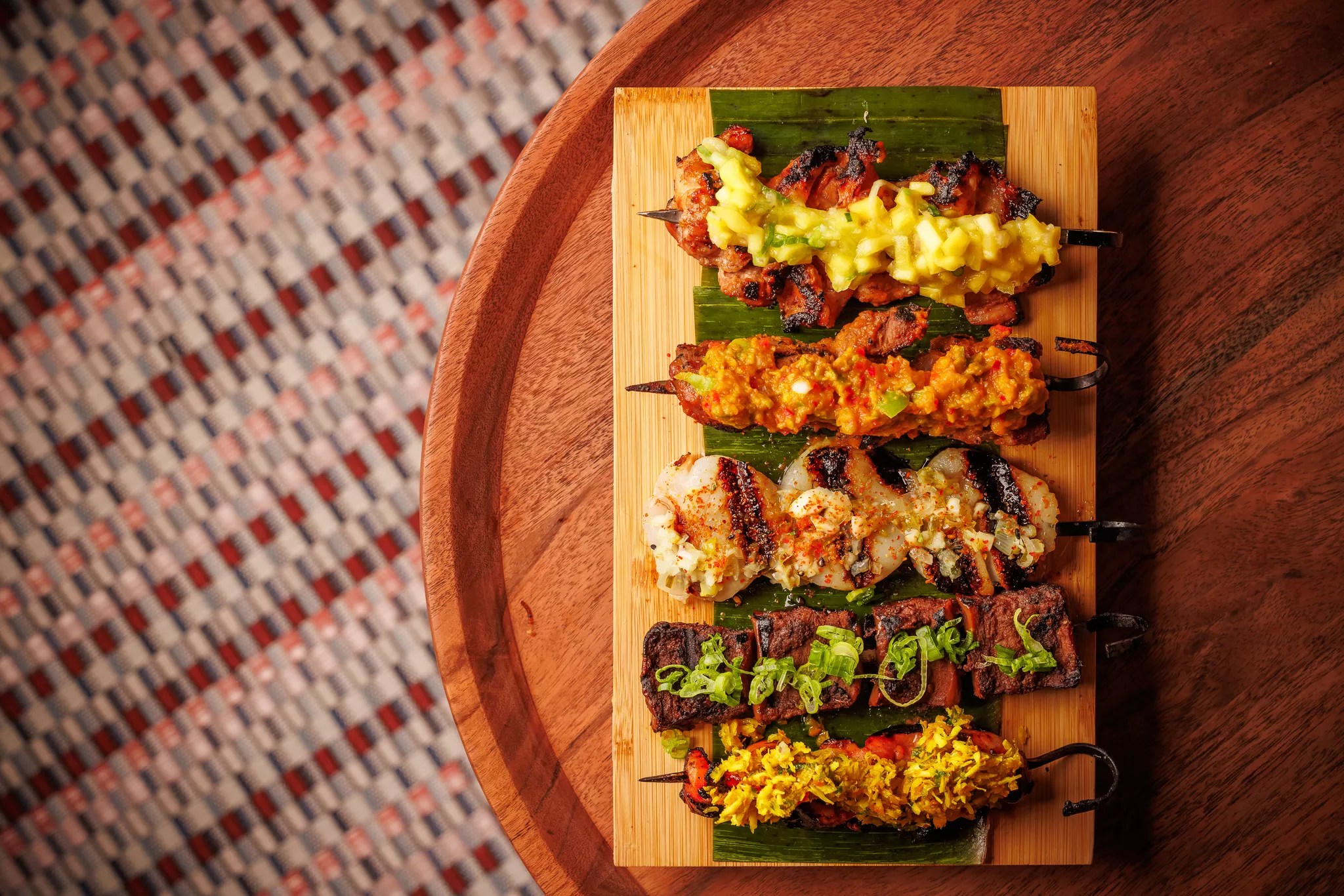
Magna Kainan skewers include eggplant, pork, chicken, diver scallops, and Colorado lamb leg
Connor Stehr
After Lamagna returned to the States and attended culinary school, he found himself melding two worlds throughout his career – taking French techniques, finding commonality across regional cuisines, and applying “chef-y” techniques to stylize Filipino food, like taking the coppa cut of a pork shoulder to slow-braise a decadent take on his father’s adobo recipe, or adding a nappé blood sauce for a shimmering twist on dinuguan, the traditional Filipino pork-blood stew.
When creating dishes, Lamagna asks himself, “How do we take that and kind of visually elevate that? Because flavor-wise, there’s no problem. There’s no doubt in my mind that [Filipino] flavors hit – that our food is amazing. But it can use a little zhuzhing just like everybody else. There’s no reason why we can’t take our food visually and take it to that next level.”
The desire to center family traditions in his food grew stronger after Lamagna’s father passed away from a rare form of cancer in 2009. Their final conversation in the hospital was “right out of a movie,” he recalls. “He said, ‘Look, I’m proud of you, and you know what you’re doing. I’m not worried about you. I just want you to remember this: Don’t forget who you are and where you come from. Celebrate who you are and share that however you can.'” To this day, his father’s message guides Lamagna’s creativity in the kitchen.
The chef’s goal is for each item on the menu to hold personal significance. For example, he recalls his father and uncle taking fourteen-hour car rides from Michigan to Baltimore for fresh blue crab, which Lamagna’s mother would prepare in her own special way. “She’d cut them in half while they’re still alive and sear them in some oil with ginger and garlic and a little bit of water and fish sauce, then steam them after searing the edges,” he explains. The result was an unforgettable sauce – a core memory that became the base of Mom’s Crab Fat Noodles on Magna Kainan’s menu.
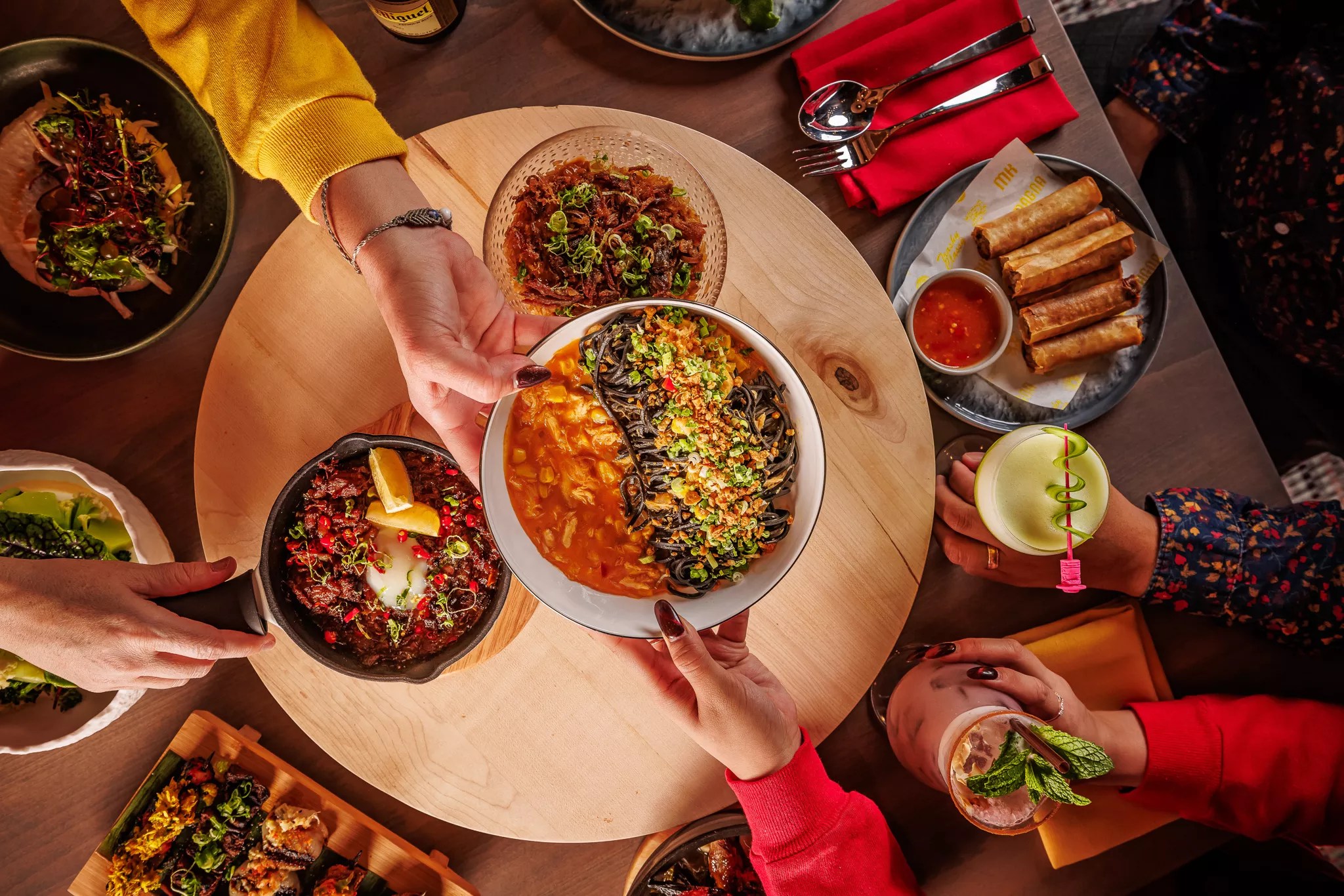
Magna Kainan’s mom’s crab fat noodles are a menu highlight with special significance
Connor Stehr
The pasta for the dish is a combination of techniques taught to Lamagna by Italian American chef Edward Leonard at Westchester Country Club in New York during his externship for culinary school and a riff on a squid ink noodle recipe from friend and colleague Joe Frillman, executive chef at Daisies in Chicago. To round out the dish, the pickled component and the pepper chow chow are inspired by renowned chef and mentor Paul Virant, who taught Lamagna the art of preservation, canning and pickling and the expert use of acidity. “It’s like all these bits and pieces of my life and memories are all involved,” Lamagna says.
Still, he’s aware of how sensitive the fight for minority representation is and how protective Filipinos are about “authentic” cuisine.
He lists major progress for Filipinos in the restaurant community, citing Amy Besa and Romy Dorotan as the OG couple to put the cuisine on the map with their now-closed New York City spots Cendrillon and Purple Yam. In recent years, he adds, Filipino food has climbed the ranks of mainstream popularity, and a small community of Filipino chefs have earned James Beard Awards, such as Tom Cunanan (2019, Best Chef: Mid-Atlantic); Timothy Flores and Genie Kwon (2023, Best Chef: Great Lakes); Margarita Lorenzana-Manzke (2023, Outstanding Pastry Chef or Baker); and Lord Maynard Llera (2024, Best Chef: California). Flores and Kwon also run the first Filipino Michelin-starred restaurant, Kasama, in Chicago. Lamagna himself was a James Beard finalist for Best Chef: Northwest and Pacific in 2022.
And yet, Lamagna says, the Filipino community at large suffers from the “crab mentality,” the philosophical metaphor of a crab trying to escape from a bucket only to be pulled back in by other crabs. One step forward, two steps back. This negativity, he suggests, is in part a by-product of Western assimilation and cultural suppression of feeling threatened or embarrassed by fellow Filipinos not blending in, but rather being loud and proud about their culture.
Of his own immigration experience, he says, “I remember the conversations growing up and being told not to cause trouble, not to cause a ruckus, to kind of just meld in.” On the flip side, he sees this issue as other people interpreting personal nostalgia as absolute ownership of flavor profiles or cooking techniques and then becoming overly defensive or critical when a dish doesn’t match their memories.
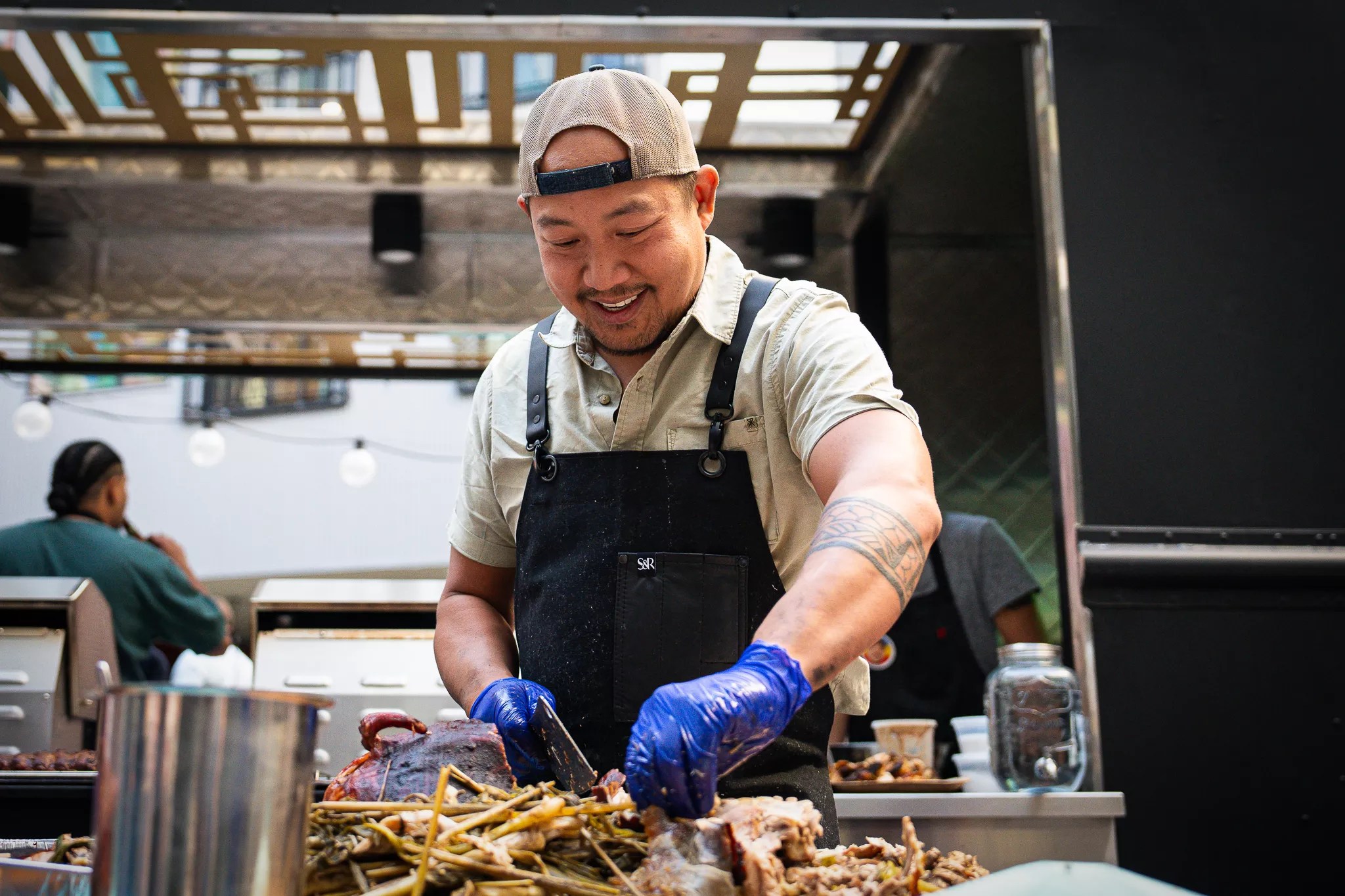
Lamagna plans to add brunch, happy hour and more to the lineup at Magna Kainan.
Chris Marhevka
His solution? “Celebrating the diversity within our own communities – Ilocano, Kapampangan, Pangasinan, Tagalog – you name it. There are so many different tribes, so many different ways to do things, and 7,100-plus islands in the Philippines. You think everybody’s going to be the fucking same? No, absolutely not,” he says, laughing. “Change happens within families, too, because tastes change. Things change. And the sooner that individuals can recognize that not everything has to be the same, the better.”
That’s why Lamagna is grateful for the support of the Culinary Creative Group and the team he’s assembled, including chef de cuisine Jodee Reyes and her sous chef/boyfriend, Juliane Gener. “I’m excited because I have two amazing cooks who are good at what they do,” Lamagna says. “They’re Filipino, and they’re dedicated to the craft of cooking, the culture and the food.” Before starting at Magna Kainan, the pair went to the Philippines for a month to get inspired, reconnect with the culture and get hyped for the opening.
The debut menu for Magna Kainan is just the preamble for what’s to come, Lamagna teases. Plans include happy hour specials, a bar program highlighting Filipino rums, weekend brunch and a chef’s-counter-style tasting menu that he has been developing for years “to really show everybody our A-game.”
Lamagna takes great pride in his cooking, and even more care in advancing a strong infrastructure of community support for one another, in the kitchen and beyond. Through these efforts, he hopes to bring people together – even if it’s for a lively debate on whose family makes the best recipes.
“Cuisine isn’t meant to be gate-kept. It’s not. It’s meant to be shared by gathering at a table,” he concludes.
Magna Kainan is located at 1350 40th Street and is open from 5 to 11 p.m. Friday and Saturday and 5 to 10 p.m. Sunday, Monday, Wednesday and Thursday. For more information, visit magnadenver.com.